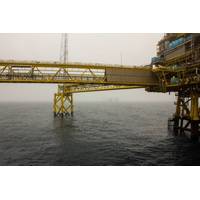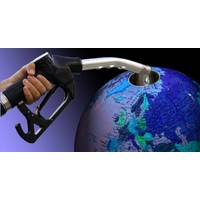Oil Prices Rise as US Shutdown Talks Advance, Oversupply Concerns Remain

Oil prices edged higher on Monday as investors assessed moves aimed at ending the U.S. government shutdown while concerns around oversupply in the crude market persisted.Brent crude futures rose 43 cents, or around 0.7%, to $64.06 a barrel by 1409 GMT. U.S. West Texas Intermediate crude was at $60.18 a barrel, also up about 43 cents or 0.7%.The U.S. Senate on Sunday moved forward…
US issue partial guidance on clean-fuel subsidies, which chastises ethanol producers
The U.S. Government released on Friday short-term guidelines on how companies could secure clean fuel tax credit under the Inflation Reduction Act. However, it did not finalize the key details of the program. The biofuels industry is eager to get clarity about the tax credits that are available for fuels which combat climate change. They hope this will allow corn-based fuel ethanol to be used as a feedstock in sustainable aviation fuel. The U.S.
Sources say that the US will release a model of clean fuel tax credit that restricts ethanol producers' access to credit.
Three sources with knowledge of the issue said that the U.S. will release a model climate for clean fuel tax credit by the end of next week. This model will drastically reduce the ability for ethanol producers access subsidies to produce sustainable aviation fuel. The climate model has been updated since the last time it was updated. This means that the exclusion of climate-smart agriculture practices, on which the biofuel industry hoped to rely, is a major reversal.
Biden Administration will not finalize the clean fuel tax credit guidelines
Three sources have confirmed that Biden administration officials won't finalize the highly anticipated guidelines for new clean fuel production credits targeted at the airline industry and biofuel industries by the time they depart in January. This casts doubt on the future success of this key part of the U.S. President's climate agenda. The tax credit was to go into effect on Jan. 1 but, due to a lack detailed guidelines from the U.S.
Starmer sets new climate goal for 2035 at COP 29
Keir starmer, the British Prime Minister, said that Britain will cut greenhouse gas emission by 81% between 2035 and 2040. He made this commitment at the United Nations COP29 Climate Summit. The new goal aligns with a committee's recommendation. Climate advisers said last month that the target should be higher than the current 78% reduction in emissions measured from 1990 levels.
China's rapid electricification is hurting oil producers, says Russell
O Ver-estimating China's desire for crude oil has played a role in the oil markets, particularly by OPEC. This theme is likely to continue into future years. China is the leader in the transition to electric cars, having already reached 50% of new sales. The rest of the globe is expected to reach this level by 2030. According to this forecast (which is what the IEA calls the Stated Policies Scenario…
Oil Barrels Toward $79 to Start '22

Oil rose towards $79 a barrel on Monday supported by tight supply and hopes of further demand recovery in 2022 spurred in part by a view that the Omicron coronavirus variant is unlikely to significantly dampen the outlook.Libyan oil output will be cut by 200,000 barrels per day for a week due to pipeline maintenance. OPEC and its allies, known as OPEC+, are expected to stick to a plan to raise output gradually at a meeting on Tuesday.Brent crude rose 95 cents…
Denmark Might Not Reach Its 2030 Emissions Reduction Goal as It 'Relies on Unproven Tech'

Denmark risks not reaching its goal to cut carbon emissions by 70% by 2030 because it is too reliant on unproven technology, an independent council monitoring the effort said on Friday.The Nordic country in 2020 set one of the most ambitious and legally binding climate targets in the world - cutting CO2 emissions by 70% by 2030 compared to 1990 levels, but its government has yet…
DNV GL: Oil Demand, CO2 Emissions Probably Peaked in 2019

Global oil demand and carbon dioxide emissions probably peaked in 2019 as the COVID-19 pandemic will have a lasting impact on both, energy consultancy DNV GL said on Wednesday.The Norway-based consultancy, which advises both petroleum and renewable energy companies on risk management and technology, said global energy use would be 8% lower in 2050 than previously expected due to the impact of the pandemic."Lasting behavioral changes to travel…
Country-by-Country Look at Dropping Fuel Demand

It's hardly news that the COVID-19 pandemic has sent most every market into tumult, most notably the oil and gas market as political power plays flood the world with oil precisely when demand has plummeted. Here we provide some recent insights on just how steep falls in fuel demand has been as lockdowns to contain the spread of the novel coronavirus limit the movement of more than 4 billion people.UNITED STATESU.S.
Norway Economic Activity Shrank 14% in March

Norway's economic activity excluding the offshore oil and gas industry fell 14% as of the end of March compared with the end of February, preliminary data from Statistics Norway showed on Wednesday in a new snapshot look at how the economy is doing.Economic activity has contracted rapidly after a lockdown was imposed in mid-March in a bid to curb the COVID-19 outbreak.The new statistical…
Exxon Cuts Spending by $10B

Exxon Mobil Corp on Tuesday throttled back a multi-year investment spree in shale, LNG and deep water oil production and will cut planned capital spending this year by $10 billion as the coronavirus pandemic saps energy demand and oil prices.Oil companies are reversing 2020 spending and production increases by an average 20% as countries limit air travel, order businesses to close and tell residents to stay home.
Sulzer Schmid’s New Tech Autonomous Drone Inspections

Sulzer & Schmid Laboratories AG has announced that it has launched a new inspection platform. The company’s new 3DX HD product has been developed as a cost-effective solution to cope with large volumes of high definition blade inspections.Based on the compact and flexible DJI M-210 drone, Sulzer Schmid’s latest innovation delivers high performance and fully autonomous drone inspections…
Distillates to Boost US Refiners' Bottom Line

U.S. refiners such as PBF Energy and Valero Energy are heading into the winter season on their best footing in years, as months of surprisingly robust distillate demand has eaten away at stubbornly high inventories and boosted margins. Inventories of diesel, heating oil and jet fuel are approaching their lowest seasonal levels in three years, fueling expectations among refining executives…
Chevron Boosts Permian Shale Output
Nearly a century after Chevron Corp amassed the No. 2 stake in America's largest oilfield, Chief Executive John Watson is hitting the accelerator on developing the company's vast Permian Basin holdings. In an interview, Watson made clear his desire to put the West Texas to New Mexico expanse in the ranks of Chevron's biggest ventures. That is a stark change from just five years ago, when Chevron executives rarely mentioned the shale basin.
India Announces Plan to Slow Greenhouse Gas Growth
India has promised to shave a third off the rate at which it emits greenhouse gases over the next 15 years, in a long-awaited contribution towards reaching a deal to slow global warming at a U.N. climate summit in December. The world's third-largest emitter and last major economy to submit plans ahead of the Paris summit did not, however, commit to any absolute cuts in carbon emissions.
Flying More Energy Efficient than Driving?
Flying has become less energy intensive than driving, at least in the United States, according to the surprising findings of an analysis of energy consumption by the University of Michigan's Transportation Research Institute. Transporting one person a distance of one mile by aircraft consumed on average the energy equivalent to 2,465 British thermal units (BTUs), compared with 4,211 BTUs for moving one person one mile by car, in 2012.
Flooding, Ice Close AK North Slope Highway
Alaska's lone road to North Slope oilfield operations has been shut for days while emergency crews divert flood waters from an adjacent river and oil companies fly provisions to the Arctic region, state and company officials said on Thursday. The road closure, however, has not affected oil production on the North Slope. Starting on March 13, the Sagavanirktok River spilled onto…
Growth Concerns Push Britain's FTSE to One-Year Low
Britain's top share index slipped for a fourth straight session to a one-year low on Friday, with concerns over the outlook for global growth prompting investors to trim exposure to cyclical stocks. Mining and energy sectors took the most points off the FTSE 100 index following a sharp decline in commodity prices, while travel and leisure shares were hit by worries about the spread of Ebola.
Modern Compasses Improve Oil Production
By using the Earth’s magnetic field, combined with new innovative technology, oil and gas drilling companies are increasing oilfield productivity while reducing development costs and environmental impacts. This technology has applications across the world, and public-private collaborations between the U.S. Geological Survey and partners have successfully implemented the technology.